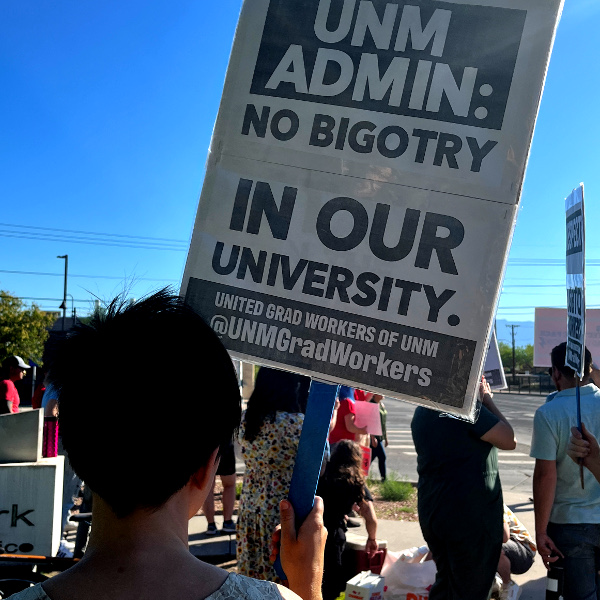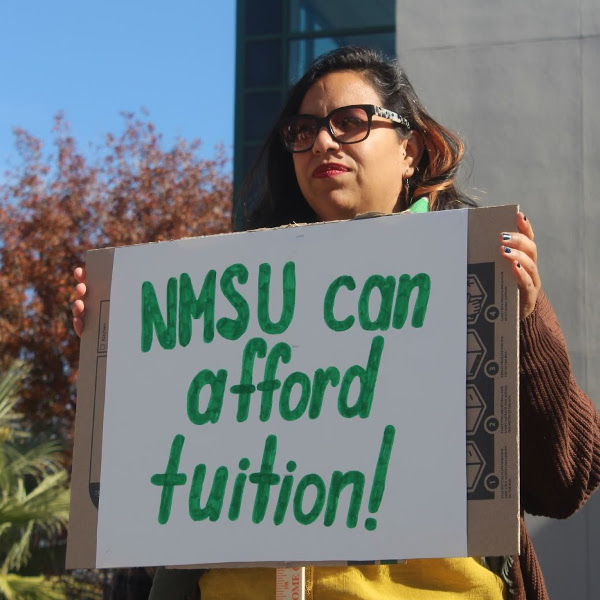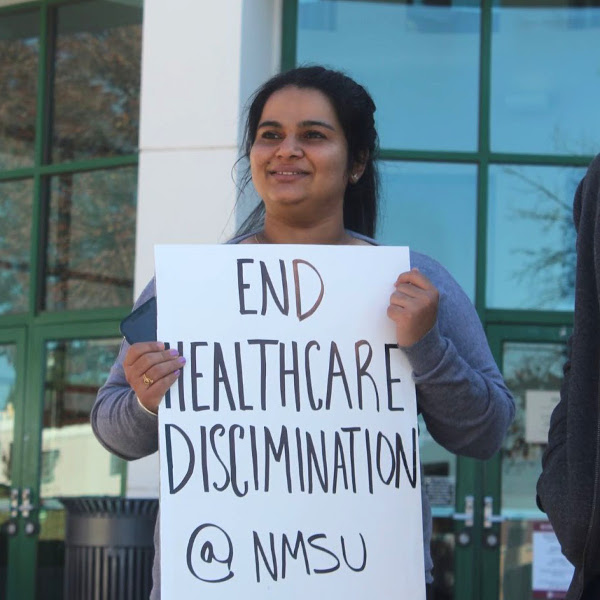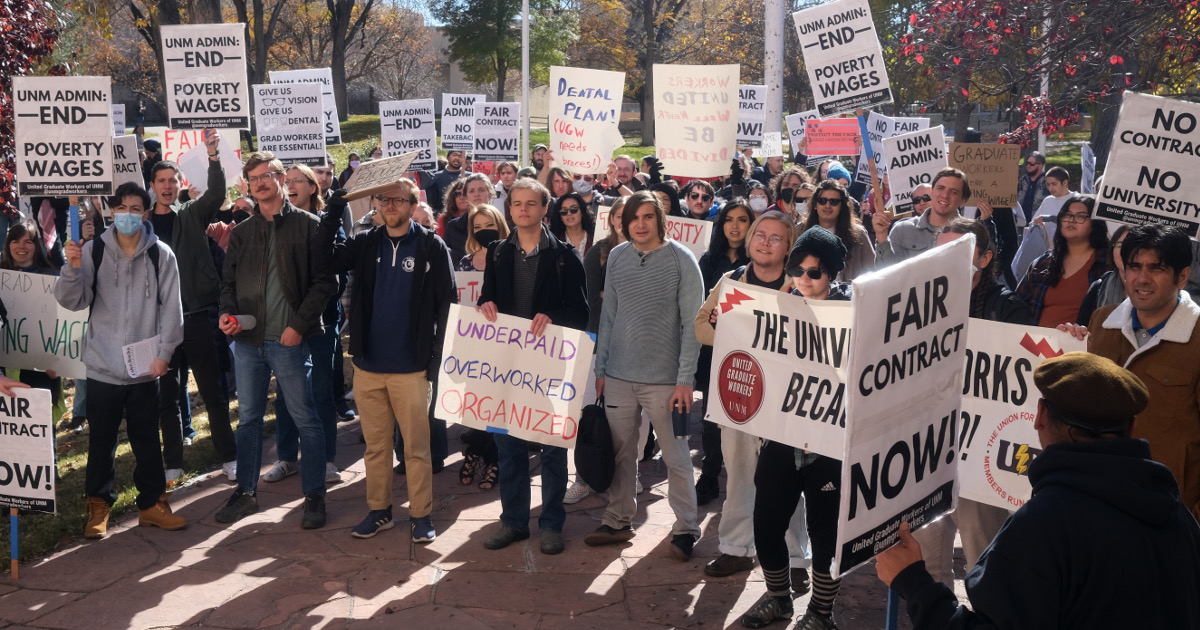Following ratification of first contracts by members of UE Local 1466-United Graduate Workers at the University of New Mexico and UE Local 1498-Graduate Workers United at New Mexico State University, thousands of graduate workers in the state are now covered by collective bargaining agreements. Both locals joined UE in historic “card check” drives at the beginning of the pandemic and have overwhelmingly ratified first contracts in mid-December, earning 7.12 percent and 6.8 percent raises, respectively, for their members. Covering more than 2,500 workers, these are the largest first contracts settled by UE in the last 25 years.
The union organizing discussed for decades by UNM graduate workers finally took shape in the spring semester of 2020. A group of graduate workers reached out to UE and hit the ground running as the pandemic exacerbated the unfair treatment and poor working conditions that existed at UNM.
One could find similar exploitation just three hours south at New Mexico State University, where concerns regarding poor living conditions had been voiced to the administration countless times to no avail. Grad workers have repeatedly spoken out about missed meals, delayed doctors’ appointments, and late rent — all of which are completely avoidable consequences of what grad workers call the “tuition crisis.” For decades, NMSU grad workers have paid more than a third of their salaries back to the university in the form of tuition — a cost which more than 80 percent of NMSU’s peer institutions do not impose. Graduate workers without US citizenship (international grad workers) face additional challenges; international grads cannot take on extra work outside the university, and are required to pay over $900 per semester for substandard healthcare through NMSU’s chosen vendor. Graduate workers from all backgrounds face food and housing insecurities because of this predatory model.
Grad workers like Mohammed Ali reported living paycheck to paycheck. “We have to pay for housing, food, insurance, and many other financial duties, and add to that the tuition! It eats almost one-third of that relatively low salary, which forces us to borrow money from anyone who will lend it…some student families suffer from low income which prevents them and their kids from doing very essential activities.” The current union movement at NMSU is several years in the making, evolving out of other groups such as NMSU FIGHT (Fair Institutional Graduate Health & Tuition).
Pandemic Spurs Organization
Graduate workers saw conditions rapidly worsen during the pandemic, which encouraged each union to organize. While the pandemic pushed organizers forward, it also created numerous roadblocks. According to Bryson Stemock, an NMSU grad worker who has been involved since those first few months of organizing, “[NMSU grads] began organizing during the height of the pandemic, which made it very difficult to reach and connect with our colleagues. It took a great deal of emails and phone calls.” By May 2022, the state labor board recognized the NMSU grads’ union, and the fight for a first contract began in earnest.
At UNM, ratification came after a long fight at the state labor board — a fight that would determine not only the right to unionize for UNM grad workers but grad workers throughout the state of New Mexico. In January 2022, the Public Employee Labor Relations Board of New Mexico finally issued union certification to UGW-UE 1466 after 10 months of legal hearings and actions held by union members. UNM began an appeal process but after significant pressure from workers, community members, and politicians, the appeal was dropped. The first bargaining between the UNM administration and the elected bargaining committee was held on May 4, 2022.
Negotiations Begin

On the first day of bargaining, graduate workers held a sticker day where members in all departments across the university wore stickers that they customized, saying why they needed a contract. News that the Labor Board had certified NMSU graduate workers’ union hit that same day. Both locals began months of negotiations for their first contracts. At each, actions were held alongside bargaining to keep up the pressure, both in and outside the bargaining room. At UNM, the administration doubled down on their refusal to include a grievable non-discrimination article, leading workers to stage a protest over the summer in front of the building where bargaining was taking place.
Ready and well-prepared, the NMSU grad workers' bargaining team began negotiations in July with a proposal for full tuition coverage for all grad workers working at least 20 hours a week. The university responded with a nonsensically low-ball offer — the first of many delaying tactics that would become the hallmark of the university’s strategy. Trevor Karpinski, a teaching assistant in Mechanical Engineering and a member of the workers’ bargaining team, observed that the make-up of NMSU’s team played a large role in setting the tone. “By the end of the summer sessions,” he explains, NMSU’s bargaining team “went from a lawyer and a team of HR reps to an HR rep and a team of lawyers.” Karpinksi says the university hid behind an expensive union-busting lawyer rather than addressing graduate workers directly.

Bargaining remained contentious and slow-moving into the semester. Negotiations were moved from the central administrative hall to a distant outbuilding on the edge of campus to discourage picketers. NMSU fought hard against including non-discrimination language that they had agreed to in another staff contract. Additionally, the university rejected grads’ proposals on wages and tuition coverage, despite absolutely having the money to pay grads a living wage, as Local 1498 demonstrated in a report issued in June. Mathematics teaching assistant Donovan Simpson, who co-authored the tuition report, asked, “If the university has the funds to support graduate students, why would they purposefully hold us [in poverty]?” To date, no university official has been able to rebut the findings in the tuition report.
Up north at UNM, the first day of the fall semester was used as another day of action. Grad workers walked onto campus together, sending the administration the message that “the semester doesn’t start until we do.” Throughout the semester, graduate workers in many departments wrote letters to their chairs in order to garner support for a fair contract. In turn, chairs were pushed to reach out to the provost and other administrators. As the semester continued, mounting actions were planned and carried out in order to draw attention to the administration’s delays and bad faith practices.
Ramona Malczynski, a teaching assistant in Geography and key organizer, explained the strength workers had during the fight: "The path to our first contract was extremely difficult but our vision of improving our lives and making UNM a better place to work kept us going. We knew we couldn't let down our colleagues who faced horrible challenges with discrimination, being unhoused, and avoiding needed medical care.” She then added, “Plus, every time the University administration stalled, tried to turn faculty or our own members against us, it only gave us more fuel to keep up the fight. I think many of us did not know if we would make it to this point, but we saw this struggle as something that would forever change labor relations at our University and so we had to win."
Keeping the Pressure On
As negotiations continued at NMSU, grad workers kept the pressure on outside the bargaining room with email campaigns and public speak-outs. During move-in weekend, grad workers including Justin Falls, a graduate worker in Anthropology, connected with hundreds of undergraduate students and their families to discuss the tuition crisis for teaching assistants. “Parents and students alike were shocked and often horrified when I told them how at least a third of what I make every year goes directly back to the university,” said Falls. “That shouldn't be normal.” Undergrads agreed, sending more than 300 emails to Chancellor Arvizu calling for tuition relief.
In September, graduate workers spoke out en masse at a meeting of the NMSU Board of Regents, giving personal testimony about the human impact of the university’s stalling. Lindley Hornsby, a grad who spoke at the meeting, was horrified as the regents refused to respond to the speakers. “I found it ghastly that after hearing story upon story, struggle upon struggle shared by grad workers, the countenances of the regents did not move an inch,” says Hornsby. After the meeting, Chancellor Arvizu promised to improve dialogue between administration and graduate workers.
Expectedly, he did not, so grad workers made themselves heard through other channels. In October, workers marched to the Regents’ office to deliver a petition signed by over 500 community members demanding tuition coverage. In December, workers and their supporters picketed outside the campus student union with chants including “NMSU works because we do!” Undergraduate students including Miranda Saenz passed out fliers and stickers. Saenz participated in the protest because grad workers were “not being treated with the respect they earned when they contributed so much to the university.”

A week later, in the midst of final exams, grad workers once again stood before the Board of Regents demanding financial relief and acknowledgement of the work they do to serve the mission of the university. Gauge Burnett (one of the authors of this article) called NMSU an “administrator-serving institution,” and added that the university’s failure to move on the tuition crisis did not live up to the promises of a land-grant institution. For the third time, the regents “elected not to communicate with us,” said Hornsby, instead choosing to hide behind a deliberate misreading of the New Mexico Open Meetings Act.
UNM grad workers engaged in a similar campaign of escalating actions. Rank-and-file union members sat in on bargaining caucuses in order to provide direct input and help fight for contract language they needed. Members of the union then announced a deadline for the contract. December 9 would be the last day of bargaining. A first contract would be reached by the end of the semester.

UGW-Local 1466 members rally for a fair contract on November 15.
Graduate workers were determined to not allow more delays by UNM administrators. They made comments at Board of Regents meetings, wrote letters to administrators, and held a march to demand that insurance costs were not raised. Members blocked traffic within the university by walking together in a continuous large group on the crosswalks. Then, members walked together into the administration’s office building to make their demands loud and clear.
The day before the contract deadline, the union held a rally in front of the university president’s office. Some vital issues were still on the table, including the university’s exclusion of Research Assistants (RAs) from the proposed raises. On the day of the contract deadline, and the last day of scheduled negotiations, general members joined the bargaining committee during caucus in order to provide needed feedback and pressure. The faculty union, United Academics of UNM, also had a presence in the building, giving support and applying pressure on the administration’s bargaining committee.
Essential Protections and Significant Raises
On the last day of negotiations, the university included RAs in the overall and minimum raises. Grad workers won a 7.12 percent overall raise for each worker and a 10 percent raise to the minimum pay. Joe Ukockis, a research assistant in the History department, spoke about his reaction to the agreement: “Having our first contract gives me peace of mind, there are structures of accountability in place now that protect me and my coworkers. Admin put up all kinds of roadblocks, but they couldn’t stop us from mobilizing amongst ourselves and our community, and that’s how we get things done!"
On top of the raises, the union won SEVIS fee reimbursements for all international students regardless of assistantship. This fee is a $350 upfront cost for international students who must apply and be granted a student visa in order to work at a U.S. university. This expense is burdensome because it forces workers to spend money before they receive their first paycheck.
Gisselle Salgado expressed their feelings after the contract was signed: “Signing the collective bargaining agreement into action felt like a concrete step in the right direction. Left battered towards the end of negotiations by the university’s strong antagonism to our general membership’s needs and ideals, I worried on what difference the contract would make. But now, I feel how having the contract gives you a floor to stand on — one which we will build off of as we create the workplace UNM grad workers deserve.”
Salgado also noted that with the first contract, union membership and power is flourishing: “We are seeing the numbers rise in our members’ advocating for themselves. While it is worrisome that our members are having issues in their workplace, the figures denote a rise in confidence, in a trust in our labor protections, in our peers and coworkers. And that is the fertile ground we will continue to nurture and grow.”
The contract ratification was years in the making, as Ramona Malczynski states: “The amazing union members I've organized with these past two years are passionate about higher education and want to be able to do their jobs better because they love to teach, do research, and work at the university. They want to be able to pursue their passion and not be anxious about affording rent, food and healthcare and without being mistreated by their supervisors. They see our first contract as a first step in improving our lives and making UNM a more equitable institution.
“I am extremely proud of what we won in our first contract because we did not give up or back down. Now we have essential protections for graduate workers at our University when before we had almost none. We also won significant increases to our minimum stipends as well as across the board raises, some of the best raises for a first contract for public sector graduate workers in over a decade.”
UNM grad workers know that this is not the end of the union’s fight but, as Malczynski said, it is “an important step in bringing what we hope will be transformative change to the University of New Mexico. This contract has shifted the power dynamic between graduate workers at UNM and the university administration forever.”
At NMSU, a final day of bargaining took place during the last week of the semester. The NMSU bargaining team placed their final financial offer on the table. It contained a 6.8 percent pay raise (which fails to meet the rate of inflation since the union was recognized), two credits per semester of tuition coverage available to certain grad workers without outside scholarships (most workers must take nine credits to maintain eligibility for assistantship), and $100 to international workers to offset the international student healthcare fee, which currently stands at over $900 for a single student. The offer also failed to offer sick, bereavement, and other leave options available to all faculty and non-student staff members at NMSU.
Still, the financial offer is the only bleak spot in an otherwise strong bargaining agreement, which grad workers ratified by an overwhelming margin. Among other things, the agreement provides protections against discrimination, overwork, and discipline without just cause, as well as a robust grievance process to enforce these and other protections. The agreement creates a forum for international grads to directly discuss issues that are relevant to them with university leadership. Finally, the bargaining teams agreed to a reopener in less than three months on tuition and wages, so that NMSU can lobby the state legislature for additional grad worker funding during the legislative session this spring. The first contract has not alleviated all the problems graduate students face but has mitigated the financial burdens of graduate workers. Members have stated that they are pleased with the contract and have already expressed interest in subsequent bargaining sessions — contracts are about continuously taking power for the workers.
Within UE, UNM and NMSU grad workers are pooling resources to create an even bigger impact at this year’s legislative session, which we hope will lead to even better economic outcomes. Both locals made sure our reopener and contract expiration dates are aligned so we can leverage the power of 2,500 graduate workers during our next round of negotiations.
Juan Ramos, a NMSU grad worker in Sociology and interim activity coordinator for Local 1498, is excited for the coming months. He wrote, “Finalizing the contract will free up the [local] to be able to organize and create a stronger union with more sustainable infrastructure for future NMSU grad students!” The UE locals at UNM and NMSU have already had joint meetings in order to build their power together and organize collectively in the state. Graduate workers know that this is the beginning of a larger movement and are proud to be at the forefront of unionization amongst higher education in the U.S.
The UGW-UE Local 1466 negotiating committee consisted of Alana Bock, Hally Bert, Samantha Cooney, Julie Hayes, Duncan McGraw, Ramona Malczynski, Anupam Mitra, Nathan Secrest, Liz Solis, and Jens Van Gysel. Chief Stewards Sasha Arteaga, Christian Rhoads, Giselle Salgado, and Jalan Ziyad served as alternates. They were assisted by Staff Coordinator Kim Lawson and Field Organizer Anna Rose. The Local 1498-GWU negotiating committee consisted of Kelley Bolland, Liam Goodale, Ellen Ijebor, Hannah Melick, Bryson Stemock, Jessica Afful Tuleassi, Matthew Varakian, and Dan Vargo. They were assisted by Field Organizers Anna Rose and Matthew Soliz.
